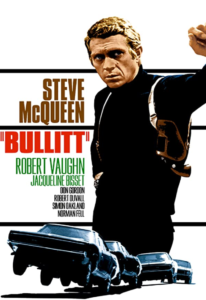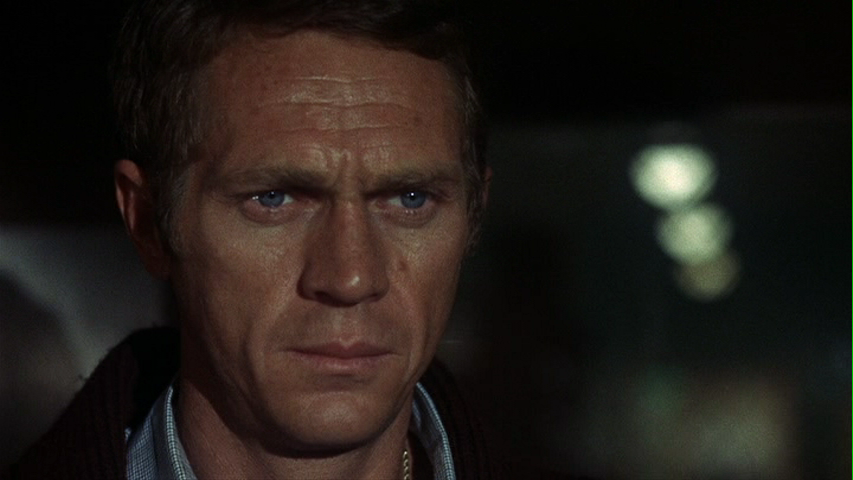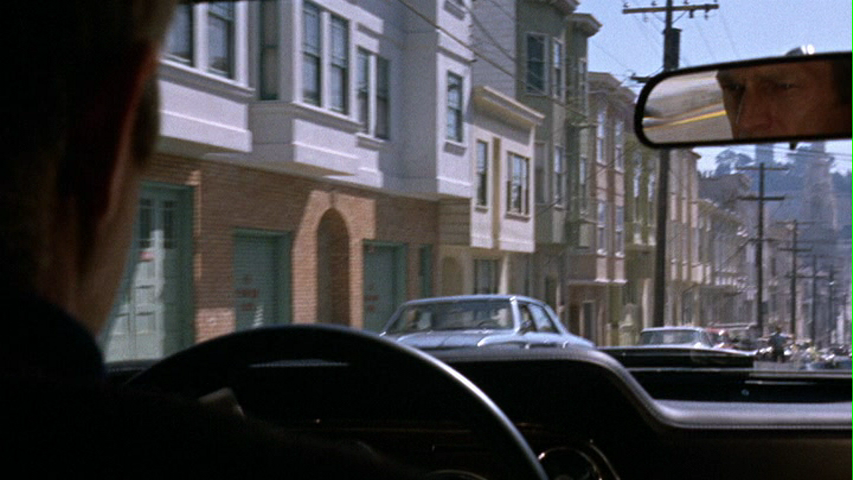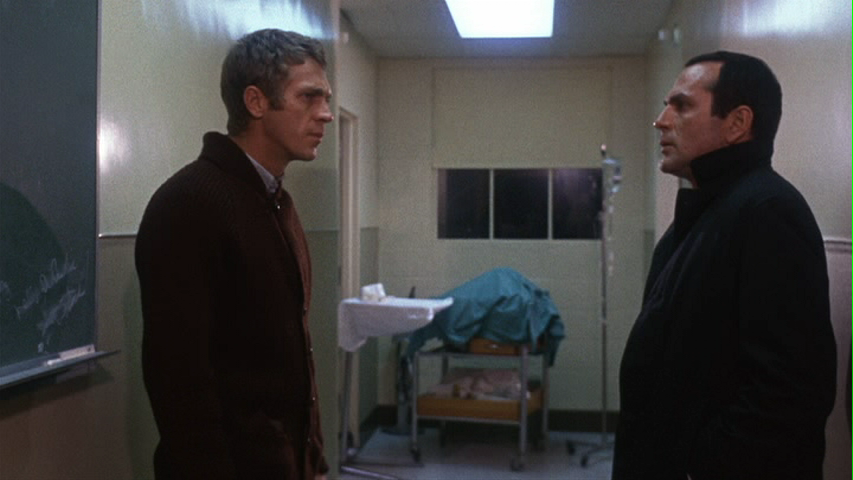Bullitt (1968)
“You work your side of the street, and I’ll work mine.”
|
Synopsis: |
Genres, Themes, Actors, and Directors:
Response to Peary’s Review: Peary notes that this film “has never been given its due” — an interesting statement, since it’s most definitely remembered and revered by many as a cult hit. (In fact, just the other day on an L.A. freeway I was driving behind a Ford Mustang GT with “Bullitt” as its vanity plate, and “Steve McQueen” written on the plate frame). But perhaps that’s exactly Peary’s point: this film is so closely associated with McQueen’s car (and the justifiably lauded car chase it’s involved in) that it’s easy to overlook how enjoyable the film is as a police procedural and character study. The investigation is remarkably well-written, with the unexpected “plot twist” that occurs fairly early on (as McQueen’s ward is murdered) leaving us wondering what will come next. Indeed, the screenplay — which uncovers a “bizarre plot involving lookalike criminals” — almost never disappoints, with just one exception: the rather thankless role of Bullitt’s girlfriend (Jacqueline Bissett); Bissett tries her best but is saddled with such a god-awful speech at one point that it actually grinds things to a halt — temporarily. Despite this minor hiccup, however, Bullitt remains a must-see classic of the genre, one which merits multiple enjoyable viewings. An interesting bit of trivia: according to TCM, Bullitt was “the first film shot entirely on location with an all-Hollywood crew” Addendum (1/14/11): RIP, Peter Yates. Redeeming Qualities and Moments:
Must See? Categories
Links: |




2 thoughts on “Bullitt (1968)”
I really enjoyed this movie. In many ways, this was a “hero cop thriller” that never even considered any of the cruft that infects modern examples of the genre. The tone of the movie was quiet and silence, only sometimes punctuated by the natural sounds of the events occurring on screen. The use of music was sparse and much less obnoxious than the ham-handed tension building tones often employed to replace what fast cuts and terrible writing fail to provide. Bullitt is a small guy who doesn’t really get physical. Like Dirty Harry, he hates the politics of police work, but instead of head-butting any politician in front of him, he just walks around them and keeps doing exactly what he wants to do. I agree with the filmfanatic that Bullitt’s girlfriend is a waste of a character. Jacqueline Bissett is stunning, as usual, but there’s nothing to do with the pathetic dialog she’s given.
Oh, and who paints a hella powerful muscle car dark green? No stripes? No wacky graphics or “high-performance” appendages? Me. If I was to build a muscle car, ending up with something that looked a lot like Bullitt’s car would suit me just fine. Actually, the bad guys’ Cougar wouldn’t be that bad either. I wouldn’t mind better suspension and tires though. It’s amazing what passed for high performance suspension and tires back in 1968.
Agreed – a must. One nifty flick – which, over forty years later, holds up pretty well and in some ways feels quite fresh.
I hadn’t seen this since its release so it actually felt rather new to me. Of course I never forgot That Car Chase (who could?) but I hadn’t remembered much else. Which is not to say that the rest of the film is a mere accessory to That Car Chase. It’s actually quite solid just about all the way through.
Why “just about”? To me, it starts out a little slow and tentative. I didn’t really feel grabbed this time round til about 20 minutes in. It’s around that point that I started to get sucked into McQueen’s character. Once you notice how quietly driven McQueen’s Frank Bullitt is, you simply can’t take your eyes off him – or his eyes, for that matter. Just watch the concentration (starting with his calm realization that ‘something’s up’) – and, behind it, the wheels turning. McQueen’s performance is one of the subtlest of knockouts. I’d put this role neck-and-neck with his work in ‘The Sand Pebbles’.
A little later in the film, you start to notice just how clever the mechanics of the script are. It’s a nice feeling as that creeps up on you. And then comes That Other Chase Scene. Gripping.
True, Bisset’s role is problematic. Aside from being ‘the love interest’, she is in the story for one reason – so that the penultimate shot in the film will make sense: McQueen looks at himself in the mirror and, no doubt, wonders what effect the ugliness of the world is having on him.
Yates has turned in one cool cop pic here. I’m glad it wasn’t met with sequels. It’s powerful and then some as is, and hardly needs a pale mirror-image of a follow-up.